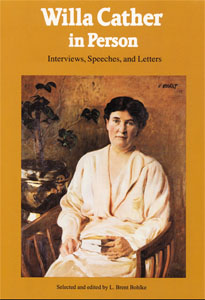from Willa Cather in Person: Interviews, Speeches, and Letters
Selected and edited by L. Brent Bohlke
Lincoln & London: University of Nebraska Press, 1986
1915: PITTSBURGH
While she was working on McClure's magazine, Cather was first exposed to the famous and great. On assignment in the Boston area for the biography of Mary Baker G. Eddy, she met Sarah Orne Jewett and Mrs. James T. Fields. She was to draw upon the experience many times—both consciously and unconsciously—during her career.
The speech she gave in Pittsburgh in 1915 was only the first of many recollections of the meeting that she was to make. Cather clipped the article about the speech from the Pittsburgh Dispatch and sent it to her family, headed with the inked notation: "You might show this to Carrie Sherwood" (Willa Cather Pioneer Memorial Collection).
BRILLIANT LITERARY LECTURE BEFORE CLUBWOMEN
Glimpses of the home of James T. Fields in Charles Street, Boston, which was for many years the innermost circle of the literary life of America, were given by Miss Willa Sibert Cather in her talk before the College Club of Pittsburg on Friday afternoon, when she took for her subject "The Art of Sarah Orne Jewett." The descriptions of the Fields residence was of more than usual interest, because of the fact that Mrs. Fields, who had lived there for sixty years, died last week, almost the last of the large circle of literary folk who were wont to meet there. Mr. Fields, who was the first American publisher for nearly all of the great English as well as American writers of his day, including Dickens, Thackeray, and Tennyson, besides being a publisher, was the personal friend of the men and women whose books he made known to the world, and many of them made the Charles Street residence their headquarters while in America. Here Thackeray wrote the chapters of Henry Esmond, and here, at the famous Sunday breakfasts given by the Fields, gathered the literati of the time.
Miss Cather told of the "long drawing room," where for many years Mrs. Fields received her guests, and which was filled with precious literary relics, including a lock of the hair of John Keats and first manuscripts of many famous writings. Many actors and actresses were as much at home in the Fields residence as were writers, though Ellen Terry was quoted as saying that she never felt quite at ease in the long drawing room, for fear she might break some of the sacred bones stored there.
For many years Mrs. Fields and Sarah Orne Jewett were close friends, and after the death of Mr. Fields, Miss Jewett spent a part of each year with Mrs. Fields, and it was here that Miss Cather, also a visitor at the Fields home, met her, and they became close friends. Miss Cather predicted for Miss Jewett lasting fame, since she wrote from the heart of life, depicting the New England character with truth and beauty. Her short stories were deemed better than her novels. Her work was said to bear a marked similarity to that of Turgenev, the Russian author, and Miss Cather told how William Dean Howells, when the books of Turgenev began to appear, gave Miss Jewett a volume, saying, "Here is an author who writes just like you do." Miss Cather quoted from a letter from Rudyard Kipling to Miss Jewett in which he told her there was more virility in one volume of her stories than in the entire work of many young authors who imagined they were writing virile literature, because they wrote of cowboys, horse-thieves, mining expeditions, and western fights. "Virility is power and poise, not noise," the letter said.
Miss Cather's story of the latter years of the life of Sarah Orne Jewett was pathetic. Following an accident in which she was thrown from a carriage, Miss Jewett found herself unable to continue her writing. She felt that she was being left behind and forgotten, but when Miss Cather visited England she found Miss Jewett's works regarded as classics there, and she met appreciation of them from many of the younger authors who had not known the author personally, as had so many of the literary men and women of former years. With much pleasure Miss Cather looked forward to bringing back this word to her friend, but before she returned she received the news of the death of Miss Jewett.
The Pittsburg[h] Dispatch, 10 January 1915.
